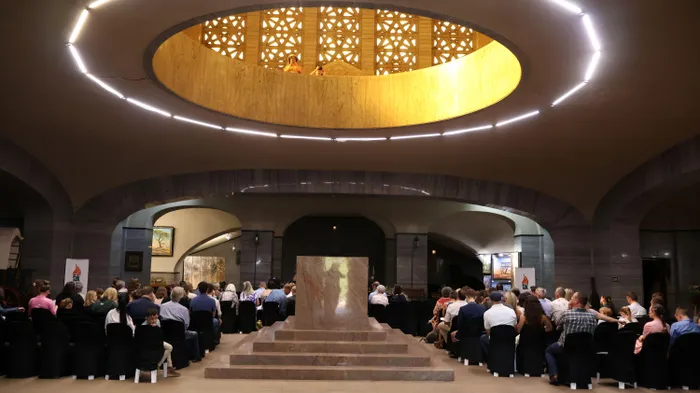AKV and FAK celebrate young artistic talent at the Voortrekker Monument

The AKV and FAK joined forces to celebrate young artistic talent during a two-day awards ceremony at the Voortrekker Monument. The event highlighted the AKV’s 93-year legacy of nurturing creativity, showcased over 4,000 entries across various art forms, and honoured Hoërskool Waterkloof with the Paul Kruger Trophy.
Image: Niël Langner
The Afrikaanse Kunsvereniging (AKV) honoured South Africa’s young artists at its annual awards ceremony, held on October 13 and 14 in the Cenotaph Hall at the Voortrekker Monument in Pretoria. The event was both a celebration of emerging talent and a tribute to the AKV’s rich history and continued contribution to Afrikaans art and culture.
Now in its 93rd year, the AKV remains a cornerstone in promoting creativity among young South Africans. Founded in 1931 under the guidance of Dr M.J. Coetzee, a lecturer at the Normal College, the organisation was established to give young people opportunities to develop and express their artistic and cultural abilities. The first official art competition took place in 1932, a landmark moment for Afrikaans culture.
Over the decades, thousands of young artists have participated in the AKV’s competitions. The event grew so prominent that in 1945, the South African Broadcasting Corporation (SABC) began airing performances of finalists on radio, bringing the excitement of the competitions into homes across the country.
Only twice in its long history has the AKV cancelled its annual events. First in 1948 during the polio epidemic and again in 2020 due to the global COVID-19 pandemic. Yet, the organisation continued to grow, a testament to its resilience and commitment to fostering artistic excellence.
Rekindling partnership with FAK
The Federation of Afrikaans Cultural Associations (FAK), which celebrates its 96th anniversary this year, joined hands with the AKV once again to promote school-based art and music talent. The two organisations originally collaborated in the 1930s before parting ways, but in recent years have reunited in their shared mission.
In 2023, instrumental section organiser Prescilla Thornhill approached the FAK with a proposal to move the competitions to the Voortrekker Monument grounds. The venue, rich in heritage, provided a meaningful cultural backdrop for the young performers.
The first instrumental competitions, particularly the piano section, were hosted in the Monument’s Chapel in 2024 and received overwhelmingly positive feedback. Visual art exhibitions were displayed in the Voortrekker Hall, and the award ceremonies were held in the grand Cenotaph Hall, with certificates sponsored by the FAK.
“We want to do more than just judge art,” said Sallas de Jager, head of arts, language, and music projects at the FAK. “We want to reconnect children and young artists with their cultural heritage. The Monument offers exactly that atmosphere – linking art with history, and creativity with identity.”
Thousands of entries and new horizons
This year’s competitions included instrumental, vocal, and ensemble categories, all hosted at the Monument. The award ceremonies, spread over two days, marked the culmination of weeks of performances held between July and August.
The instrumental gala on October 13 honoured outstanding performances in brass, woodwind, violin, piano, orchestral, and composition categories. The following evening, October 14, celebrated achievements in vocal performance, speech, and creative writing, with over 120 awards presented.
Participation numbers were impressive: 2,100 entries and 980 individual competitors in the instrumental section alone, and more than 4,000 entries across all art forms, from fine art to drama, solo singing, and choral performance.
Honouring excellence
One of the most coveted awards, the Paul Kruger Trophy, was once again presented to the school with the highest number of entries. This year, the honour went to Hoërskool Waterkloof, recognised for its enthusiasm and engagement in arts education.
AKV Chairperson Charmaine Potgieter said the renewed partnership with the FAK has brought “fresh energy and opportunity” to the long-standing competition. She added that the AKV remains committed to inclusivity, welcoming entries from preschools, primary schools, high schools, private art institutions, and studios.
Looking ahead, Potgieter hopes to introduce a dance category next year. “We’re privileged to reap the rewards of nine decades of cultural dedication,” she said. “The AKV endures because parents, teachers, and institutions still believe in the value of art as part of education and identity. These children are the custodians of tomorrow’s cultural heritage.”
As De Jager concluded: “When a child steps onto a stage or in front of a canvas and expresses themselves, something remarkable happens. That’s cultural development in its purest form, and that’s why we’re here.”
Related Topics: